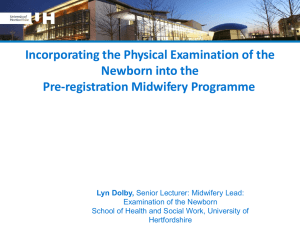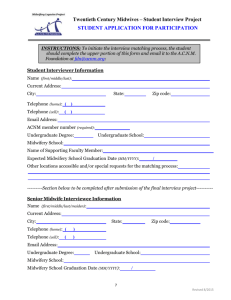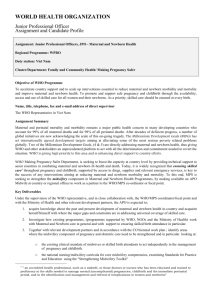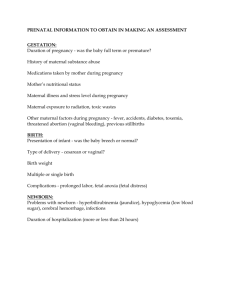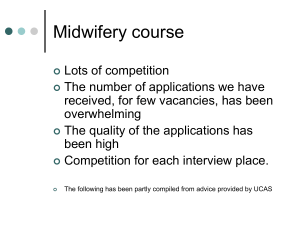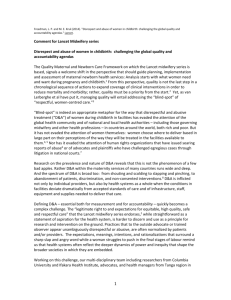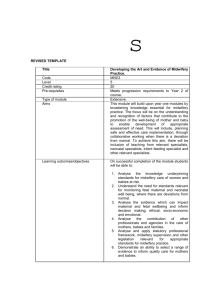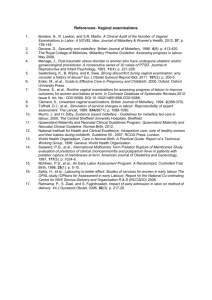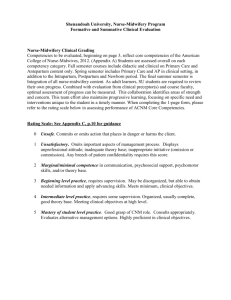Tanzania: Maternal and Newborn Health
advertisement
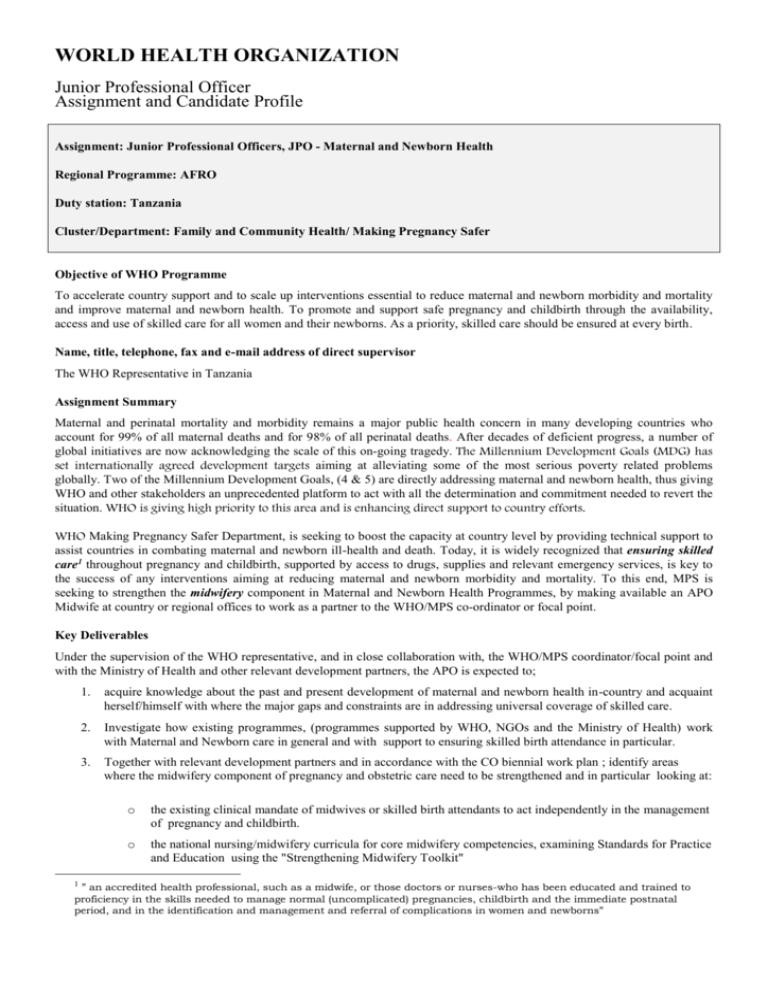
WORLD HEALTH ORGANIZATION Junior Professional Officer Assignment and Candidate Profile Assignment: Junior Professional Officers, JPO - Maternal and Newborn Health Regional Programme: AFRO Duty station: Tanzania Cluster/Department: Family and Community Health/ Making Pregnancy Safer Objective of WHO Programme To accelerate country support and to scale up interventions essential to reduce maternal and newborn morbidity and mortality and improve maternal and newborn health. To promote and support safe pregnancy and childbirth through the availability, access and use of skilled care for all women and their newborns. As a priority, skilled care should be ensured at every birth. Name, title, telephone, fax and e-mail address of direct supervisor The WHO Representative in Tanzania Assignment Summary Maternal and perinatal mortality and morbidity remains a major public health concern in many developing countries who account for 99% of all maternal deaths and for 98% of all perinatal deaths. After decades of deficient progress, a number of global initiatives are now acknowledging the scale of this on-going tragedy. The Millennium Development Goals (MDG) has set internationally agreed development targets aiming at alleviating some of the most serious poverty related problems globally. Two of the Millennium Development Goals, (4 & 5) are directly addressing maternal and newborn health, thus giving WHO and other stakeholders an unprecedented platform to act with all the determination and commitment needed to revert the situation. WHO is giving high priority to this area and is enhancing direct support to country efforts. WHO Making Pregnancy Safer Department, is seeking to boost the capacity at country level by providing technical support to assist countries in combating maternal and newborn ill-health and death. Today, it is widely recognized that ensuring skilled care1 throughout pregnancy and childbirth, supported by access to drugs, supplies and relevant emergency services, is key to the success of any interventions aiming at reducing maternal and newborn morbidity and mortality. To this end, MPS is seeking to strengthen the midwifery component in Maternal and Newborn Health Programmes, by making available an APO Midwife at country or regional offices to work as a partner to the WHO/MPS co-ordinator or focal point. Key Deliverables Under the supervision of the WHO representative, and in close collaboration with, the WHO/MPS coordinator/focal point and with the Ministry of Health and other relevant development partners, the APO is expected to; 1 1. acquire knowledge about the past and present development of maternal and newborn health in-country and acquaint herself/himself with where the major gaps and constraints are in addressing universal coverage of skilled care. 2. Investigate how existing programmes, (programmes supported by WHO, NGOs and the Ministry of Health) work with Maternal and Newborn care in general and with support to ensuring skilled birth attendance in particular. 3. Together with relevant development partners and in accordance with the CO biennial work plan ; identify areas where the midwifery component of pregnancy and obstetric care need to be strengthened and in particular looking at: o the existing clinical mandate of midwives or skilled birth attendants to act independently in the management of pregnancy and childbirth. o the national nursing/midwifery curricula for core midwifery competencies, examining Standards for Practice and Education using the "Strengthening Midwifery Toolkit" ” an accredited health professional, such as a midwife, or those doctors or nurses-who has been educated and trained to proficiency in the skills needed to manage normal (uncomplicated) pregnancies, childbirth and the immediate postnatal period, and in the identification and management and referral of complications in women and newborns” o 4. existing structures for Accreditation of Midwifery training in dialogue with relevant partners at MOH/Nursing Council. Advocate for the use of the Integrated Management of Pregnancy and Childbirth (IMPAC) -tools and discuss with relevant partners how they can be used to strengthen core midwifery competencies in clinical practice as well as to promote its use as a teaching aid in the schools of nursing and midwifery. Minimum Qualifications and Experience 1. 2. 3. 4. 5. 6. A solid academic background with a minimum of a Bachelor's degree in Midwifery or a Medical degree or a Masters in Public Health At least 2 years of working experience in provision of obstetric care or a similar area. Working experience from developing countries is highly desirable as well as work experience in an International Agency/Environment. Good interpersonal skills with ability to work harmoniously with colleagues of different nationalities and cultural background. Good communication skills and proficiency in oral and written English. Good computer skills. Additional Desirable qualifications 1. 2. 3. 4. t Post graduate Diploma or Master's degree in Midwifery Working experience in Programme Management Development studies or studies in International Health Midwifery education and/or experience of curriculum development Achieving the learning objectives Objective 1. 2. 3. To acquire knowledge about the past and present development of maternal and newborn health incountry. Activity Responsibility APO Timing On arrival and on-going Read documents produced in-country by different actors in the area of maternal and newborn heath, so as to get an understanding and overview of the current and past situation To Investigate how existing programmes, supported by WHO, other Agencies and the Ministry of Health; work with Maternal and Newborn health in general and with support to ensuring skilled birth attendance in particular. Build a network of contacts with other stakeholders and explore areas of possible collaboration, utilizing different agencies' comparative advantages. APO/ MPS Focal point To identify gaps relating to core midwifery skills. Explore ways of strengthening skills for practising health professionals practising midwifery, using the IMPAC-tools (Integrated Management of Pregnancy and Childbirth). APO /MPS Focal point Review need for local adaptation of IMPAC and plan for its dissemination, implementation and use. On arrival an on-going 4. To identify areas where the midwifery component of pregnancy and obstetric care need to be strengthened and in particular looking at: - the existing clinical mandate of midwives or other skilled birth attendants to act independently in the management of pregnancy and childbirth. Using the Midwifery Toolkit ; make an assessment of the current situation and needs to strengthen core midwifery competencies in-country. Examine existing Standards for Practice* (i.e. an agreed level of performance to achieve a specific outcome) using the "Strengthening Midwifery Toolkit" and in close collaboration with relevant institutions propose ways of improving and implementing these standards. As and when arranged On-going APO together with MPS.Focal point and other relevant partners Examine existing Standards for Midwifery Education* standards can be improved and institutionalized ( if they are not so already) to ensure high quality training of midwives. -the national nursing/midwifery curricula for core Midwifery Competencies, -existing structures for Accreditation of Midwifery Education, Teachers and Practitioners. * In countries where Standards for Practice and Education do not exist or where a National regulation of Midwifery is weak, a plan to strengthening these structures should be initiated. 5. To identify constraints in addressing universal coverage of skilled care. Identify and initiate planning in areas in which WHO can support efforts to enhance training of health professionals with midwifery skills. In addition to what has been said under point 4 above about Standards for Practice and Education; investigate the gaps in skilled human resources ( health professionals with midwifery skills) in different settings and identify areas in which WHO can support efforts to enhance training and retention of health professionals with midwifery skills. The progress towards achieving the objectives will be evaluated annually by the APO together with the first and second level supervisors. Achievement will be against an agreed work plan. Please attach the following documentation: 1. Organizational chart (with names of staff members) 2. Programme profile 3. Living Conditions in the country of assignment
